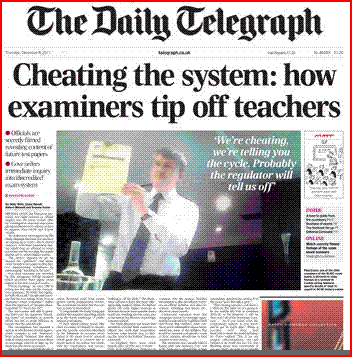
An undercover investigation by the Daily Telegraph into the school exam system has sparked an official inquiry and is leading the broadcasting news bulletins today.
The Telegraph investigation has exposed examiners giving teachers secret advice on how to improve their GCSE and A-level results.
The investigation comes in the same week that undercover reporting by the Bureau of Investigative Journalism, published in the Independent, has exposed the "dark arts" of political lobbyists.
Both investigations go some way to rehabilitating the image of journalism, which has taken such a battering in the evidence given to the Leveson Inquiry into press ethics, by showing how undercover reporting can be in the public interest.
The investigation by the Daily Telegraph discloses that teachers are paying up to £230 a day to attend seminars with chief examiners during which they are advised on exam questions and the exact wording that pupils should use to obtain higher marks.
One chief examiner was secretly recorded telling teachers which questions their pupils could expect in the next round of exams. “We’re cheating,” he says. “We’re telling you the cycle [of the compulsory question]. Probably the regulator will tell us off.”
Education Secretary Michael Gove has ordered an official inquiry following the Telegraph's investigation.
- Meanwhile, new revelations about political lobbyists by the Bureau of Investigative Journalism, published in the Independent, show that one company made hundreds of alterations to Wikipedia entries about its clients in the last year. Some of the changes added favourable comments while others removed negative content. The Independent credits blogger Tim Ireland for spotting some of the Wikipedia changes. Several Wikipedia accounts have been suspended pending an investigation by the co-founder of Wikipedia, Jimmy Wales.




No comments:
Post a Comment